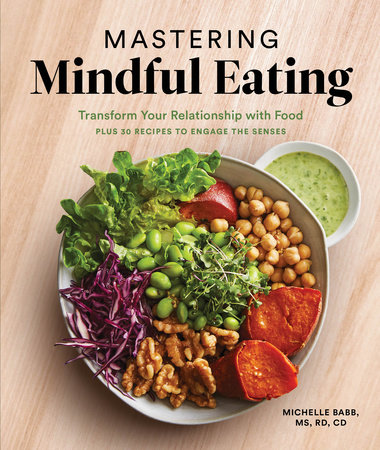What Is Mindful Eating? diet verb di·et \ˈdī-ət\
Restrict oneself to small amounts or special kinds of food in order to lose weight.
Source:
Oxford Dictionary of English Restriction. Deprivation. Shame. Guilt. Frustration. Disappointment. Failure. These are all words that accurately describe the setup of our chronic dieting culture. There is a multibillion-dollar industry built entirely on the premise of keeping people forever fearful of gaining weight and desperate to find “the best way” to lose it. It’s called the dieting industry and it has made this business of eating
way too complicated.
Eating your way to a sustainable weight and optimal health is simpler than it seems. In fact, you were born to do it. We all have the innate sensibilities to tell us what to eat, when to eat, and
how to eat, but we learn how to override those cues at a very early age and then we spend a lifetime neglecting our bodies and ignoring the signals that tell us everything we ever needed to know. We’re also manipulated by ingredients in processed foods and fast food that are designed to cause cravings and fuel the desire for
more.
Have you ever heard that weight loss is a simple “calories in, calories out” equation? That’s how calorie counting became an obsession and the grams of fat, carbs, and protein on the nutrition facts panel became the litmus test for evaluating food. I call this
the science of eating, where the focus is squarely on calories and single nutrients in food. It ignores the synergistic qualities of all the complex compounds in foods and completely discounts the energetic properties of the foods we eat. And while there is a reality to the effectiveness of caloric control, we’re going about it the wrong way. For most people, being accountable for every morsel of food they consume (through tracking, logging, and paying penance for their food sins) is completely unsustainable. Not to mention that the nutritional quality of the food matters. We now have more information to add into the mix: we know that the foods we eat actually speak to our genes, greatly influencing gene expression, and our diet and lifestyle choices also impact the microbiome in the gut.
What if you could find your way back to that magical place where you trust your body enough to allow
it to dictate what, when, and how you eat? Where you listen intently to how your body is communicating with you and you respond accordingly. This is when you give up that war against your body, abandon the idea of trying to beat it into submission, and instead create a lasting partnership with your body that’s based on trust, respect, and love. I refer to this as
the art of eating.
diet noun di·et \ˈdī-ət\
Perpetual self-nourishment.
“Diet” doesn’t have to be a dirty word. It can describe a nurturing way of feeding yourself. It’s the ultimate act of self-care and it has to be done mindfully, with purpose and intention. People in our Western culture don’t just accidentally eat well. Americans are confronted with over two hundred decisions about food and eating
every single day. Living in the land of plenty actually makes the art of eating considerably more difficult. We’re constantly distracted by flashy packaging, compelling advertising, and clever food marketing strategies. Couple that with a pattern of mindless eating and you’ve got the perfect formula for a nation of people who are chronically overfed and undernourished.
I teach classes and lead workshops on mindful eating. I ask my patients to unplug, slow down, and treat this sacred act of self-nourishment as if it’s an important event that deserves their undivided attention. When they practice this way of relating to food and eating, amazing things happen. Not surprisingly, people eat less when they give themselves time to recognize satiety cues and they feel more satisfied after eating. Digestion also improves. Through slow, steady breathing and relaxation, the body shifts from fight-or-flight to rest-and-digest mode and the food moves through the digestive tract more easily and nutrients are readily absorbed.
This book is a compilation of the tools I’ve used with thousands of patients and students over the years, many of whom have successfully broken free from the dieting mentality and continue to enjoy a healthy, satisfying relationship with food. As you navigate your way through the book, take time to actually do the activities and reflect on your experiences. You may get stuck in some of the sections, and it may feel like it’s taking you longer than you expected to really “get it.” Remember that you’re trying to change some well-worn psychological pathways that you’ve been using for decades. You’re trying to forge new pathways and you’ll undoubtedly bump up against some resistance. That’s part of the process, and it’s totally normal. Give yourself some grace and practice patience as part of your self-care routine.
I even have patients who start to panic several weeks into the program despite getting great results. They question how weight loss can feel so effortless and wonder if they’ll continue to see results if they don’t have to suffer and feel deprived. That’s when the deprogramming really begins. The dieting mentality would have you believe that finding and maintaining your healthy weight is a “no pain, no gain” proposition. You have to prove to yourself that nourishing food can taste good, mindful eating is the best method for portion control, and you
deserve to feel joyful, energetic, and powerful in your body.
This is not a program designed for rapid weight loss and is not intended for those who want to drop twenty pounds in two weeks. It’s a journey of self-exploration, reflection, and the creation of new thoughts, feelings, and behaviors.
Mastering Mindful Eating helps you find your way home so that you can forever give up the struggle and create a lasting partnership with your amazing body. I hope you’re excited to embark on this journey!
Copyright © 2020 by Michelle Babb, MS, RD, CD. All rights reserved. No part of this excerpt may be reproduced or reprinted without permission in writing from the publisher.








